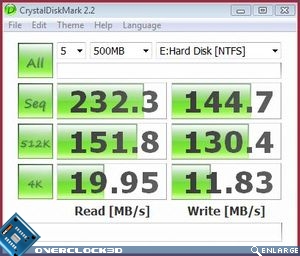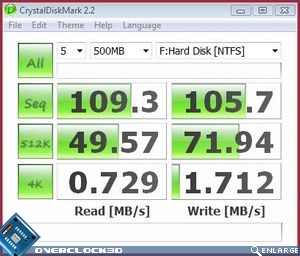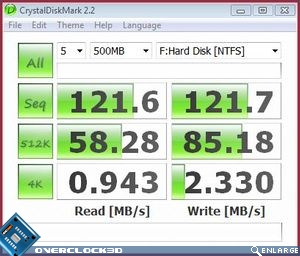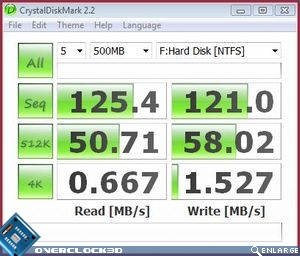OCZ Vertex 120GB SATA2 SSD
CrystalDiskMark
CrystalDiskMark is a free utility maintained by Japanese company Crystal Dew World. CrystalDiskMark evaluates the performance of your hard drives based on two tests – a sequential read/write test and a random read/write test. You can select the drive to test, the number of test and the size of the data to test which can be 50MB, 100MB, 500MB and 1000MB. The results displayed below have been conducted using 5 rounds of the 500MB test.
OCZ Vertex |
WDC Caviar Black |
WDC Velociraptor |
Samsung F1 Â Â |
A pattern is certainly beginning to emerge as the Vertex once again makes fun of the mechanical drives in the sequential and 512k read results beating them by around 100MB/s. The write results are slightly more evenly matched with the Velociraptor and F1 drives sharing almost identical scores, but the Vertex one again leading the pack by around 20MB/s.
Based upon the 5K chunk results produced from ATTO over on the previous page, we was half expecting the Vertex to fall short in the 4K CrystalDiskMark testing. However, once again the Vertex reigned supreme with an absolutely huge advantage over its opponents.
Â
PCMark Vantage
PCMark Vantage may sound like potentially the most ‘synthetic’ benchmark on the market, but this couldn’t be further from the truth. In a whitepaper published by Futuremark (developers of 3DMark and PCMark) they describe how PCMark mimics actual PC usage by performing application launches, web browsing, video playback, photo editing, file searching, and other day-to-day tasks. This potentially makes PCMark Vantage the most ‘real world’ benchmark of them all, and therefore we will be breaking down the HDD Suite benchmark into its various sections in the graphs to give you the whole picture.
The graph really speaks volumes about how much better the Vertex is than it’s mechanical ancestors. While the Caviar, Velociraptor and F1 drives fight for their positions, the Vertex rockets into the lead offering performance almost 10x higher in certain areas of the benchmark. Keeping in mind that PCMark is one of the most comprehensive ‘real-life’ benchmarks used in our testing, it really does look like the faithful old hard drive has spun its last disk.Â


